- Home
- Julie Hyzy
Grace Against the Clock (A Manor House Mystery) Page 8
Grace Against the Clock (A Manor House Mystery) Read online
Page 8
He must have sensed my discomposure because he pointed. “A big hint as to who you are is the fact that you’re carrying those blueprints. I signed out three sets last week.” He counted aloud as he tapped the tops of the rolls I carried. “One, two, three. The gentleman—Frederick—who picked them up, explained all about your renovation plans.” He pointed again. “Let me take those from you.”
Happy to be unburdened, I handed the blueprints over. “We really enjoyed going over those drawings. I didn’t even realize you kept those sorts of records here.”
His eyes crinkled up and he cast a loving gaze around the room. “There is so much here to discover. I wish more of our citizens would take better advantage of all we have to offer.”
“I’m one of those guilty of not visiting before now,” I said. “If it weren’t for Hillary and Frederick, I probably wouldn’t even be here today.” A framed picture on the wall caught my attention. “This is a great shot of the Promise Clock,” I said. Peering closer, I noticed the photographer’s name. “David Cherk’s work?”
“Most of the modern shots on display are his,” Wes said. “We hire him from time to time for specific projects, but he also donates whatever doesn’t sell.”
“That’s nice of him.”
One corner of Wes’s mouth twisted up. “I get the feeling he’s more interested in tax deductions than philanthropy.” He carried the blueprints around to the other side of the counter. “He told me about what happened at the benefit. That had to be horrible.”
“Already? When was he here?”
Wes scratched the side of his head. “Stopped by yesterday afternoon to drop off a whole stack of donations. The one of the clock seemed to fit that space so I hung it up last night. I haven’t had time to put any of the others up yet.”
Behind the long oak counter was a wall of wide, short drawers. Wes opened one of them and gestured for me to come around. “Here’s where we keep your house’s plans,” he said as I joined him.
The drawer was filled with other sets of plans, which I asked about.
He lifted one corner of the pile and riffled through. “Your neighbors. We don’t have floor plans or original blueprints for every home in Emberstowne, but we have quite a few. They’re filed here according to address.”
“Can anyone take them out? Like at a library?”
He made a so-so expression. “We discourage people removing items from the premises, because not everyone is diligent about returning them.” Closing the drawer again, he smiled. “But as you can tell, we do make exceptions.”
“I appreciate that. And because we were so prompt at returning them, will that help in the event we ever need to look at them again?”
“Anytime.”
I turned to make my way out along the back area, passing a desk that had been tucked into a nook behind the counter. A jar of clear liquid sat next to a framed photo of a thirty-something woman with dark hair and a winning smile. The glass container wasn’t labeled—it looked to me like a pickle or canning jar that had been repurposed—and it seemed out of place.
“What’s that?” I asked.
He peered around to see what I was pointing at. “That’s David’s. He left it here by accident yesterday when he dropped off the photographs.”
“What is it?”
Wes tapped the metal cap. “I have no idea, but I assume it’s chemicals. You know, he still prefers print over digital photography.”
“He mentioned that,” I said. “Several times.”
“He called to ask me if he’d left stuff here. He forgot this, too.” Wes picked up a taped-shut cardboard box and shook it. The top of the box read: PERSONAL AND CONFIDENTIAL. Whatever was inside rattled, sounding like hollow plastic balls bouncing against one another.
“That’s curious.”
Wes shrugged. “He didn’t mention what was inside, and with a sign like that scrawled across the top, I wasn’t about to look. Doesn’t matter; David said he’d be back today to pick it all up.”
I pointed to the framed photograph at the desk’s edge. “Is that your wife?”
Wes picked up the picture. “Lynn.”
“She’s lovely.”
“Thank you.” His mouth tightened briefly before he continued. “We would have been married fifteen years this December.”
“Would have?”
“She died.”
“I’m sorry,” I said. “I didn’t—”
“Don’t apologize. You couldn’t have known. Lynn passed away well before I moved here.”
I was at a loss for words. “I’m sorry,” I said again. “Was it an accident?”
“Aneurysm.” He put the photo back on the desk. “Never saw it coming. She’d been sick for a while, but we’d gotten through the worst of it. Thought we had all the time in the world. But fate had other plans.”
I struggled to find solid conversational footing. “Where did you live before moving here?”
“Seattle,” he said. “Lynn loved it there, but once she was gone, I couldn’t bear to stay. I looked around for whatever job would take me as far from Seattle as I could get.” He held out both hands. “That’s how I ended up here.”
Searching for something positive to add, I said, “We’re glad to have you.”
“Emberstowne has been good for my soul.” He took a long look around the room. “I’ll never stop missing Lynn, but here at least I’m starting to find peace.”
I took a look at the black-rimmed schoolhouse clock on the wall. “I ought to get going,” I said. “Thank you again for all your help.”
“My pleasure,” he said. “Keep in mind that our files are open and if there’s ever anything you need, all you have to do is ask.”
* * *
When I got back to my office, I ran into Flynn, looking surly as usual.
“I told him you’d be here shortly,” Frances said with a frown of disapproval. She checked her watch. “But he was about to leave.”
Not looking at my assistant, Flynn said, “I don’t have all day. I’m not about to sit on my hands and wait for you when I have a potential homicide to solve.”
“Homicide,” I repeated. “Do you believe Dr. Keay was murdered?”
He looked like he was about to say, “Yes,” but thought better of it. “Now that you’re here, I can spare a couple more minutes.” He pointed. “Your office.”
“Please,” I said, allowing him to go first. Behind his back I sent Frances a wide-eyed “I wonder what this is about” look.
I didn’t shut the door between my office and Frances’s. Flynn didn’t complain.
“How’s Rodriguez?” I asked as I took a seat behind my desk. Flynn lowered himself into a chair across from me. The man fidgeted constantly and his gaze never seemed to rest on any location for more than a beat or two.
“He’s better. Specialists are taking a look at him today. Looks like he will need a new valve.”
I grimaced. “That’s a tough surgery,” I said. “Is he a good candidate?”
“Because he’s so overweight, you mean?” Flynn asked, dropping any pretense of being polite. “Doctors are worried about that. When I find out more I’ll let you know.”
I was about to ask about that “potential homicide” comment, but he didn’t wait for the opening. “I’m here to take another look at the scene,” he said. “You don’t need to accompany me or anything. After all the incidents you guys have had here, I can find my way around pretty well.”
Feeling prickly after his comment about past troubles at Marshfield, I said, “Thank you for making it clear that you aren’t asking permission or for company. But then why come talk to me at all? Is this a social visit?”
His gaze stopped bouncing and he shot a withering, arrow-straight look at me. “If that’s what you want to call it, be my guest. I came to let you in on some i
nformation. Information I am not required to share. Given the circumstances, I thought it best to keep you posted.”
“I’m sorry for being flip, then.” And I was. “Go ahead.”
He resettled himself in his chair, perching on its edge, and leaned forward. “You may or may not know that taking blood alcohol level readings on a dead body can be tricky.”
I’d heard as much, but let him continue without interrupting.
“Part of the decomposition process involves putrefaction,” he said as casually as if he were discussing what he intended to have for lunch. “Putrefaction can cause higher blood alcohol readings than are wholly correct. I mean, it depends on other considerations, like what the victim ate. That can factor into it. Readings might not always give you an accurate idea of how much liquor the victim consumed.”
“Putrefaction?” I said. “That takes a while, doesn’t it?”
He gave an emphatic nod. “Depends, again, on the circumstances. What’s important here is that the accuracy of a blood alcohol test diminishes the longer a person has been dead. Which is why I asked the coroner to take a reading Saturday night.”
“You did?”
“Everybody there claimed that Dr. Keay didn’t drink. They swore he never touched the sauce anymore. But you told me you smelled alcohol on him.”
“I did.”
“Based on that, and knowing that our window of accuracy would be closing soon, I made the call to take a reading.”
“And?” I prompted.
“Levels are off the charts,” he said. “The coroner couldn’t believe that Keay managed to stand upright, even for that brief moment you saw him, with that quantity of liquor in his body. He took a second reading to confirm. The coroner says it was like nothing he’d ever seen before. They’ll be doing a full autopsy today.”
I’d seen Leland Keay when he’d first arrived. I’d bumped into him a few times before David Cherk had alerted me that the doctor had gone missing. The man hadn’t been drunk—not even tipsy—when I’d seen him. How could he have consumed that much alcohol in such a short period of time? It didn’t make sense. And if he had given up liquor completely the way everyone believed, then why had he done such a dramatic flip-flop? And why at a high-profile fund-raiser?
“There are too many questions surrounding this death,” Flynn said, echoing my thoughts. “I’m not letting it go until I have answers.”
“That’s a commendable attitude,” I said. “I’m glad.”
One eye narrowed.
“I mean it,” I said. “Whatever you need from me, from Marshfield, let me know. You have our full cooperation.”
“That so?” he said. “Then I’ll ask you to stay out of my way and not get involved in the investigation.”
“I never intend to.”
He got to his feet. “That’s the part that scares me.”
I stood up to walk him out. “Will you have a new partner assigned until Rodriguez returns to the force?”
He shrugged. “Right now my chief isn’t convinced this is a homicide. He wants to wait and see until the autopsy results are in. Which means I’m on my own.”
“I hope, for both our sakes, that it turns out that Dr. Keay died of natural causes.”
“So do I,” he said. At the doorway, he turned and added, “But we both know better, don’t we?”
Chapter 11
When the door closed behind Flynn, Frances folded her arms across her chest and said, “So it is a murder, after all.”
“We don’t know that,” I said.
The look on her face told me that she, Flynn, and I were in agreement, maybe for the first time in our lives.
“The guy was one of the most respected cardiothoracic surgeons in the country,” I said. “From the little bit I talked with partygoers, everybody loved him. Who would want him dead bad enough to kill him?”
“Joyce Swedburg, maybe?”
That made no sense to me. “You told me they’ve been divorced for years. Why now, all of a sudden?”
“Because he was pressuring her to sell their house. I told you she kicked him out, right? When they settled their divorce, she got to stay in the house for a specified amount of time. From what I’ve been hearing, that time was up and he wanted the place sold. She refused to go.” Frances lifted one shoulder.
“Why didn’t she simply buy him out?” I asked.
“Can’t,” Frances said. “You look at her, you see a successful attorney. She’s got to be rich, right? Not so much. A couple years ago she invested in a friend’s company that went belly-up. Her retirement accounts took a huge hit. She’s not destitute, but there’s no way she could afford to buy out half that mansion she lives in. Not with her current state of affairs.”
“How do you know this?”
Frances got a sly look on her face. “Friends.”
“Friends who share confidential information?” I said, aghast yet not entirely surprised.
Another shrug. “What else are we going to talk about around here? We thought that once you started dating that rock star guy we might have a chance for juicy gossip. Keeping an eye on you two has been as boring as watching concrete harden.”
I ignored that. “I don’t know,” I said. “That seems like a pretty lame motive for murder. Dr. Keay was very well off. I can’t imagine why he’d try to push Joyce out if he didn’t really need the cash.”
“It’s not always about money,” Frances said.
She was right about that. “I suppose if Keay felt somehow emasculated by having his wife defend him, then subsequently dump him, this could be his way to reassert power.”
She flapped her hands up. “Ooh, you’re a psychologist now.”
I glared.
“All I’m saying is that the two of them weren’t getting along so well lately,” she said.
I thought about their interactions when they’d been together in the basement before the party. “You are missing one important point.”
“I know.” Frances’s mouth twisted. “Joyce Swedburg wasn’t at the party.”
“Exactly.”
“She could have met him earlier and fed him some poison that only presents like alcohol when it takes effect.”
“Oh?” I knew my expression conveyed my skepticism. “What kind of poison does that?”
“How should I know? You’re the one who finds answers when people get themselves killed around here.” She pointed to the computer monitor. “You should look that up. Figure it out. Whatever she fed him would have to have been a time-release kind of drug.”
“I don’t think such a thing exists.”
“What, you’re a pharmacological expert now?” She rolled her eyes. “However do you find the time?”
I pulled in a deep breath. “What about the mistress, the woman who was in the accident with Keay?” I asked. “I understand that was five years ago, but could she have harbored a grudge all this time? Maybe she was one of the attendees Saturday night.”
Frances shook her head. “That ship has sailed. Once the story was out, her husband filed for divorce. She left Emberstowne as soon as it was final. Haven’t seen or heard from her since.”
“One night of carousing resulted in two divorces,” I said. “Sad.”
“One night?” Frances repeated with a snort. “It was that woman’s bad luck that she’s the one who got caught. The way he ran around town womanizing, it could have been almost anybody.”
The way she said it made me think, for one second, that Frances might be speaking from experience. I tried to imagine what she’d been like five years earlier. I doubted the woman would have ever kept company with a married man, but I couldn’t resist the urge to needle her a little bit. “Anybody?” I asked. “Don’t tell me you fell under the handsome doctor’s spell?”
“Certainly not,” she said with
a haughty glare. “I’ve got good sense enough to know better than to go for those smarmy types. How could you even suggest such a thing?” Without waiting for me to answer, she shifted gears. “You may find this interesting: The woman from the accident used to live in the house next to yours. Her husband still lives there, though why he keeps such a big place for only one person is beyond me.”
“Next door?” I had neighbors on both sides, but only one was a divorced man living alone.
Frances and I said the name together: “Todd Pedota.”
* * *
That night, in my basement at home, Scott, Bruce, and I unloaded all the dust-covered supplies that had accumulated on the workbench through the decades. When that task was complete, we toasted the structure a fond farewell.
“So it’s coming down tomorrow.” With a glass of Malbec held aloft, Bruce used his other hand to push sideways against one of the now empty inner shelves, making the whole contraption wobble and squeak. “I think there’s mold growing in there.” He regarded his fingers then wiped his hand on his jeans. “This demolition project’s coming not a moment too soon.”
I sipped my wine and then took a few steps back, tilting my head to look at the warped monstrosity from another angle. Turning my back to it, I looked at the rest of the basement and wrinkled my nose. “Doesn’t this seem like an odd place to put a workbench?” I asked.
I turned back to face them. Bruce and Scott looked confused.
Bootsie took that moment to join us, coming around the far corner with an air about her that seemed to ask what the three of us were up to.
“If it were me,” I said, reasoning aloud, “I’d position the workbench closer to the rear of the house, nearer to the steps and back door. I mean, if you’re going to make the effort to create a work space, wouldn’t you situate it more conveniently?”
My roommates appeared either unconvinced of my logic or unsure of where I was going with this. I continued, my thoughts flowing full force as I put them into words. “I can’t imagine why a person would put a workbench all the way at the home’s front, when there was plenty of space in the area at the bottom of the stairs.”

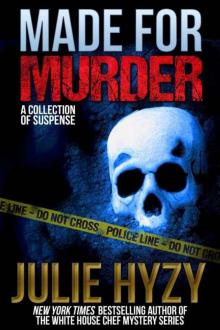 Made for Murder
Made for Murder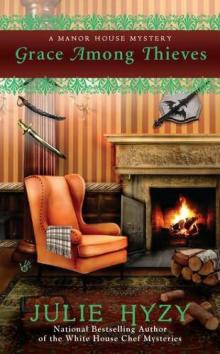 Grace Among Thieves
Grace Among Thieves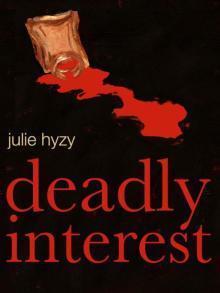 Deadly Interest
Deadly Interest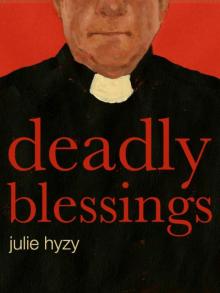 Deadly Blessings
Deadly Blessings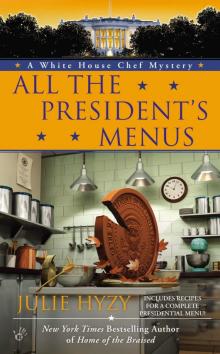 All the President’s Menus
All the President’s Menus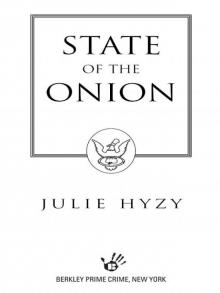 State of the Onion
State of the Onion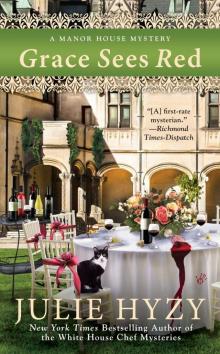 Grace Sees Red
Grace Sees Red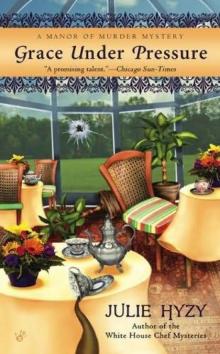 Whitehouse Chef 04 - Grace Under Pressure
Whitehouse Chef 04 - Grace Under Pressure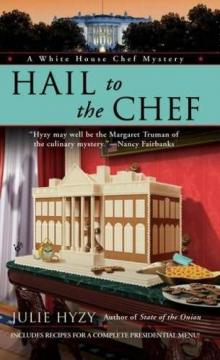 Hail to the Chef
Hail to the Chef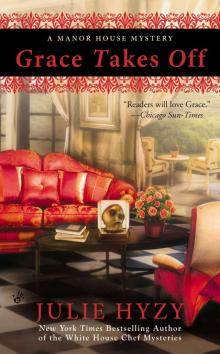 Grace Takes Off
Grace Takes Off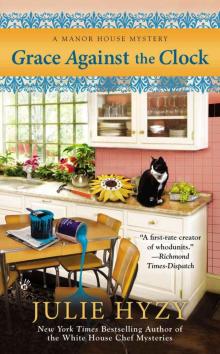 Grace Against the Clock (A Manor House Mystery)
Grace Against the Clock (A Manor House Mystery)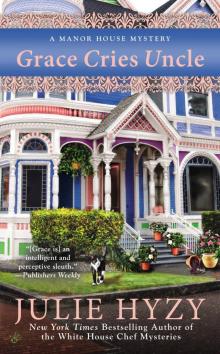 Grace Cries Uncle
Grace Cries Uncle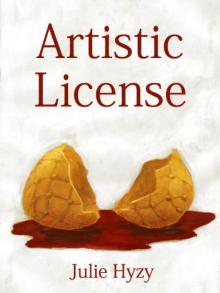 Artistic License
Artistic License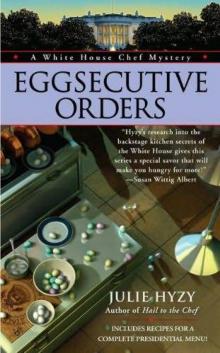 Eggsecutive Orders
Eggsecutive Orders Grace Interrupted
Grace Interrupted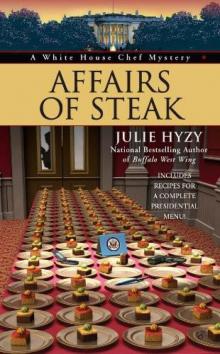 Affairs of Steak
Affairs of Steak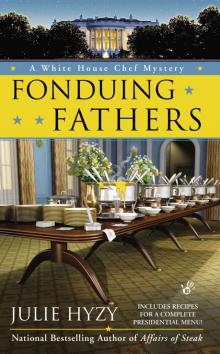 Fonduing Fathers
Fonduing Fathers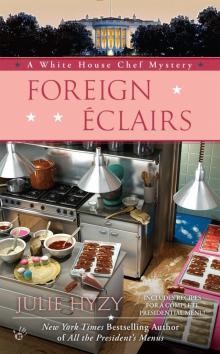 Foreign Éclairs
Foreign Éclairs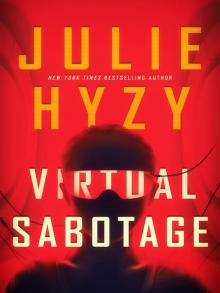 Virtual Sabotage
Virtual Sabotage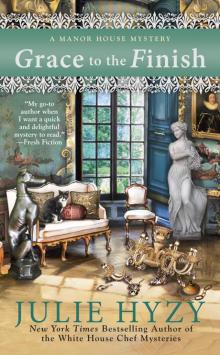 Grace to the Finish
Grace to the Finish